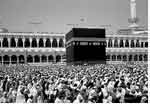 His diary notings carry
fascinating insights into cultural, political, and economic aspects of
contemporary life. They also reveal his own view on several global issues of
tremendous significance.
His diary notings carry
fascinating insights into cultural, political, and economic aspects of
contemporary life. They also reveal his own view on several global issues of
tremendous significance.
What was the status of women in the Arab world of those times? While
commenting on his celebration of Id in Mecca on March 12, he says he found Arab
women in Western attire, while the young were roaming without the veil. Another
interesting account is the role muallims (guides) played in making Hajj
arrangements — he found them irresponsible and exploitative. This is documented
during his visit to Medina. He writes: “May my countrymen have the foresight to
stay clear of those muallims who are not present in Mecca during the time of the
Hajj and leave their clients to fend for themselves!”-- Shaikh Mujibur Rehman
By Shaikh Mujibur Rehman
JOURNEY
TO THE HOLY LAND - A Pilgrim's Diary: By Amir Ahmad Alawi; Translated and with
an introduction by Mushirul Hasan and Rakhshanda Jalil; Oxford University Press,
YMCA Library Building, Jai Singh Road, New Delhi-110001. Rs.
650.
Amir
Ahmed Alwai wrote Safar-I-Sadaat in Urdu based on his daily accounts of his Haj
experience. He undertook the Haj journey that spanned more than four months,
beginning January 31, 1929. This book is its English version. The objective
evidently is to make it accessible to a wider audience. One of the negative
offshoots of the British colonial rule has been the damage native languages
suffered on account of the dominance of English, which virtually became a global
lingua franca, so to say. And Urdu is among the worst victims. The irony of it
all is that the most vehement of the critics of imperialism are also the most
committed champions of English. This translated work can well be seen as an
attempt to demonstrate that native languages are indeed a reservoir of vital
sources of historical and other information and are as effective a medium as
English to tell the human story.
Quite
enlightening is the 69-page introduction which provides an incisive analysis of
the contemporary literature on Haj experiences, apart from giving a detailed
account of Alwai's life, career, antecedents, and, more importantly, the
socio-historical importance of the region he belongs to. Marked by profound
scholarship and intellectual richness, this piece bears the unmistakable imprint
of Mushirul Hasan, who has a towering presence among contemporary historians,
thanks not just to his several volumes of scholarly work but also to his
creation of a new genre of historiography on modern India by employing varying
methodologies. There is also an interesting chapter by J.S. Kadri, titled ‘My
experience in Hajj in 1916', which provides a comparative perspective on such
empirical accounts of Haj pilgrimage.
Meticulous
It is to
the credit of the author that he has given day-to-day account of his travel,
meticulously recording his experience and encounters, on some occasions in
excruciating detail. As is to be expected, the narrative runs into five/six
pages on days that were eventful, while it is brief — containing in some cases
not more than 50 words — on other days. His diary notings carry fascinating
insights into cultural, political, and economic aspects of contemporary life.
They also reveal his own view on several global issues of tremendous
significance.
What was
the status of women in the Arab world of those times? While commenting on his
celebration of Id in Mecca on March 12, he says he found Arab women in Western
attire, while the young were roaming without the veil. Another interesting
account is the role muallims (guides) played in making Hajj arrangements — he
found them irresponsible and exploitative. This is documented during his visit
to Medina. He writes: “May my countrymen have the foresight to stay clear of
those muallims who are not present in Mecca during the time of the Hajj and
leave their clients to fend for themselves!”
The
author talks about an incident on February 13 in which how a British sergeant
assaulted the Bengali hajjis who constituted a sizable section of 1200-strong
contingent in his ship. He was enraged to see his fellow hajjis humiliated, but
what is intriguing is the way he reflects on this episode. He notes: “Had they
been Punjabis or Afghans, this ill-tempered Englishman would have got his just
deserts.” This observation is suggestive of the fact that Muslims of the time
had their own perceptions of Muslims of other regions. Afghans or Punjbis are
seen in this instance as more aggressive and having a stronger sense of
self-respect as opposed to Bengali Muslims, but this was long before the Mukti
Bahini came on the scene in East Pakistan, where Punjabi Muslims suffered
humiliation at the hands of Bengali Muslims during the Bangladesh war. Overall,
this lucidly written diary is an indispensable source for students of
comparative religion and Indian history.
Source: The Hindu, India




 Sultan Shahin
Sultan Shahin


0 comments:
Post a Comment